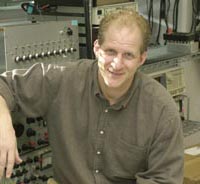Abstract: This talk will review recent progress in the control of single electron spins in quantum dots, with an eye toward someday building a quantum computer based on electron spin as a holder of quantum information. The main technical challenge, which is preserving the long coherence time, raises an important physics question: why is it so hard. We report on recent experiments by our group and others on spin quantum bits in GaAs and other materials, including carbon nanotubes and Si nanowires.
Biography: Charles Marcus is Professor of Physics at Harvard University and Director of Harvard’s Center for Nanoscale Systems. Marcus was raised in Sonoma, California, and was an undergraduate at Stanford University (1980-84). He received his Ph.D. at Harvard in 1990 and was an IBM postdoc at Harvard 1990-92. He was on the faculty in Physics at Stanford University from 1992 to 2000, then returned to Harvard University. Marcus is the recipient of the 2006 Newcomb-Cleveland Prize, the A.P. Sloan Fellowship, the Presidential Faculty Fellowship from the NSF, and the ASSU Teaching Award from Stanford University. Marcus has published over 130 research papers. Research in his group involves the fabrication and measurement of submicron electronic structures—semiconductor quantum dots, carbon nanotubes, and graphene-based microstructures—and the measurement of electron transport in these structures, usually at low temperatures. His scientific interests include mesoscopic quantum phenomena at the interface between micro and macro scales, where quantum properties coexist with disorder and decoherence. Currently, research activities include the realization of spin-based qubits for quantum information processing and the realization of topological quantum computing schemes based on the 5/2 fractional quantum Hall state. Marcus is also exploring the use of quantum dots in medical imaging, focusing primarily on materials with long nuclear spin relaxation as an imaging agent for magnetic resonance imaging.

